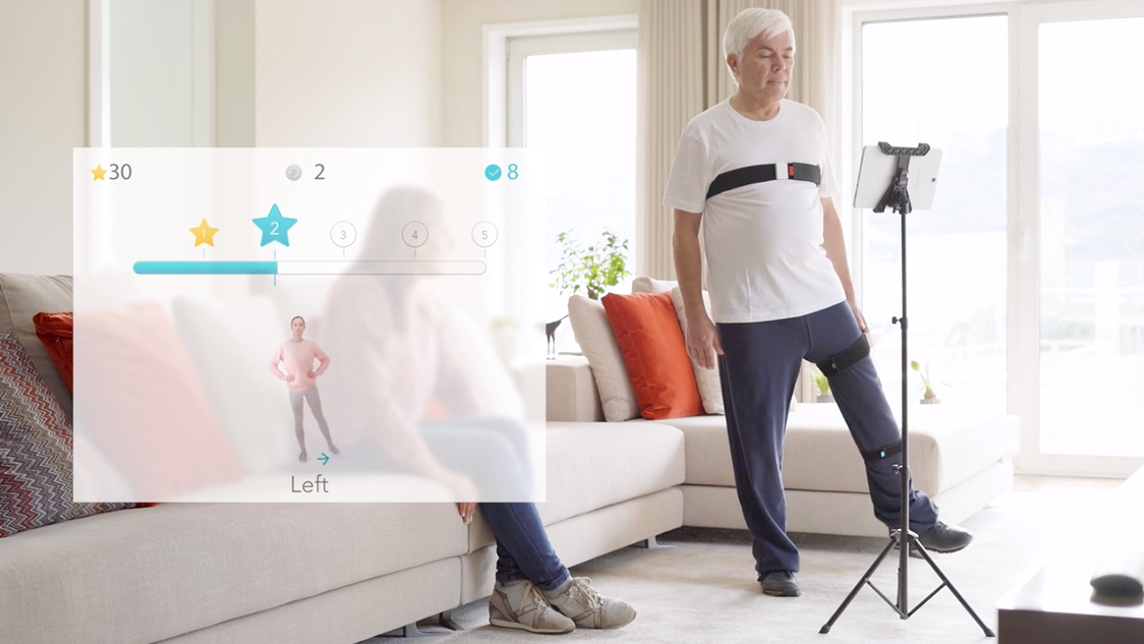A medtech startup has raised the second biggest Series A funding round in Portugal, beating records set by unicorns like Farfetch and OutSystems. SWORD Health, the world's first digital physiotherapist for musculoskeletal disorders, secured $17m after Silicon Valley investors Khosla Ventures and Founders Fund pumped in $9m via a second phase Series A end of Februrary, following $8m first raised in April 2019.
Established in late 2013, the Porto-based company is addressing a severe global shortage of qualified physiotherapists, which has created a market for home rehabilitation forecast to be worth over $176bn by 2023. SWORD Health offers an AI-based, sensor-equipped device that lets patients undergo physiotherapy at home. The device is connected to an app for the patient, displaying his therapy outcomes each session, and via the cloud to the patient's physiotherapist at the clinic. The startup is treating about 400 patients a month, via clients such as healthcare providers, insurers and employers, in the US, Canada, Australia, South Africa, Mexico, Japan, Norway and Portugal.
SWORD Health's total funding to date has exceeded $22m, since it obtained its first funding of $160,000 from Brain Trust in 2014. The latest funds will be used to accelerate scaling through investments in new partnerships, distribution, sales and marketing channels. The company, which currently has four overseas offices, will also boost clinical and operational investments to enhance patient-user experience and recovery.
Portugal's top Series A fundraiser is unicorn Talkdesk, the cloud-based customer service call center, which raised $21m in a two-phased investment in 2015–16. Luxury e-retailer Farfetch raised Series A funding of $4.5m in 2010, while low-code platform OutSystems went straight from seed to Series B funding of $5.4m during the period of 2005–07.
More affordable, with faster results
The idea for an integrated physiotherapy app was originally conceived by CEO and co-founder Virgilio Bento in 2012. Bento was only 10 years old when his brother was involved in a serious accident and needed intensive physiotherapy to recover from his injuries. Bento recalled how difficult and expensive it was to get such treatment for his brother due to the acute shortage of physiotherapists at local clinics and hospitals.
First based at the University of Aveiro as part of the Startup Braga incubator, the company developed SWORD Phoenix, which can be used to treat around 90% of musculoskeletal disorders, producing 29% better outcomes than conventional therapy according to the company. The risk of patients dropping out is also greatly minimized, with 96% of SWORD Phoenix users sticking to their prescribed therapy program five days a week. The delivery of high-quality physical therapy is done remotely, reducing the pressure on overstretched human physiotherapists who have to treat many patients, each requiring two to three hours of therapy daily.
SWORD Health also aims to bring down the cost of private physiotherapy, which is still unaffordable to many all over the world. SWORD Phoenix costs from €50 monthly, up to five times less than in-person treatment by physiotherapists. The SaaS platform interacts with the patient via a tablet displaying performance outcomes using data collected by sensors strapped to the body part being treated. The sensors also relay results and progress to the platform that are also monitored externally by SWORD Health staff and reported to the patient's designated physiotherapist at the clinic.
The goal is to help patients overcome their pain faster without resorting to surgeries or opioids. SWORD Health's long-term aim is to free 2bn people from pain by making it simple for everyone to prevent and recover from musculoskeletal issues at home.
The startup won the Digital Health Award 2019 for the Best Digital Solution for Employer Wellness and Prevention, awarded by the University of California in San Francisco. The company's extra $9m funding was secured after a bumper year in 2019 that saw the number of patients doubling that of 2018.
Its KPI data showed that patients spent more than 580,000 minutes using SWORD Phoenix in 2019. They were also saving time by cutting down on travel, by over 1.6m km, for treatments at clinics. SWORD Health also announced that it has established a Clinical Advisory Board to assist in further essential clinical validation of its products.
Poised to lead sector
Backed by its new investors, SWORD Health will be able to strengthen its global brand recognition to become a key player in the massive US healthcare industry. Musculoskeletal disorders are the number one cause of the colossal medical costs incurred by employers in the US. Elsewhere, it is estimated that China has only one physiotherapist for every 100,000 citizens, whilst even the world's most comprehensive health services, the UK, for example, only has one therapist per 2,000 inhabitants.
Khosla Ventures doubled its initial investment in SWORD Health's Series A round because it reckoned the startup is well positioned to lead the physiotherapy sector. Headed by Indian-born tech pioneer and founder of Sun Microsystems Vinod Khosla, Khosla Ventures focuses on Black Swan investments with a special interest in healthcare.
“SWORD’s digital clinical care model has been shown to significantly improve healthcare outcomes for patients while reducing employer costs, reshaping the future of physical therapy,” said Khosla.
Founders Fund believes that SWORD Health has found the ideal solution to help solve the opioid problem as preventative physiotherapy. The fund has invested in more than 500 startups including Airbnb and SpaceX. It has also managed exits from giants like Facebook and Spotify.
Two new investors also joined SWORD Health funding round for the first time: Unbabel investor Faber Ventures with a special interest in early-stage Portuguese tech and San Francisco-based angel investor and entrepreneur Lachy Groom. Existing investors that increased their stakes in SWORD Health include US developer of biological technology Green Innovations and Luxembourg's healthtech fund Vesalius Biocapital III.















